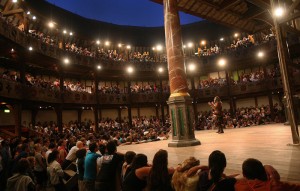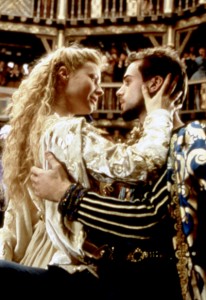 Today marks Shakespeare’s 449th birthday! Well, sort of–he was baptised in his hometown of Stratford-on-Avon on April 26, 1564, and since that usually happened about 3 days after a baby was born, plus it’s St. George’s Day AND Shakespeare died on April 23 in 1616, it just makes a neat little juxtaposition, so April 23 is the Official Day.
Today marks Shakespeare’s 449th birthday! Well, sort of–he was baptised in his hometown of Stratford-on-Avon on April 26, 1564, and since that usually happened about 3 days after a baby was born, plus it’s St. George’s Day AND Shakespeare died on April 23 in 1616, it just makes a neat little juxtaposition, so April 23 is the Official Day.
Not much is really, concretely known about Shakespeare’s personal life. He grew up in Stratford, where he probably attended the free local grammar school, The King’s New School. His father was a glover in town who was very prosperous for a time (and married an Arden, local gentry), but then kind of went downhill. At 18 he married Anne Hathaway, who was 26 (the hussy!) and gave birth to their first child, Susanna, 6 months later. Twins followed, Judith and Hamnett (Hamnett died at 11, but Judith grew up to make a disappointing marriage). Between 1585 and 1592, he built a successful theater career with the Lord Chamberlain’s Men (later the King’s Men) as an actor, playwright, and eventual sharer in the company. He made enough money to buy New Place, the biggest house in Stratford, as well as rent respectable lodgings in London (see Charles Nicholl’s book The Lodger Shakespeare about a lawsuit he got embroiled in via his landlords the Mountjoys on Silver Street. His part in the quarrel was tiny, but it’s a great picture of London life at the time). Around 1613 he retired back to Stratford where he died 3 years later. His direct line ended with his granddaughter Elizabeth, but his monument can still be seen at the church there. That’s about it really, though bits and pieces keep popping up to give grist to the scholarly mill. He left 38 plays, 154 sonnets, and 2 long narrative poems.
 But what’s really important isn’t what Shakespeare did in his life, but the beauty of the words and the worlds he left us, which have brought such immense joy to so many people and taught us so much about the world around us and ourselves. One of the best nights in my life was spent at the Globe Theater, watching a production of A Midsummer Night’s Dream, imagining what it must have been like to be there when those words were first spoken, and what that world must have been like. (This also happened to be the first Shakespeare play I ever saw, when I was about 7! An outdoor production where Puck would climb the trees to say his lines, which really impressed me then…) I just saw a production of Love’s Labors Lost (not the best play, but fun) updated to the 1950s, where it lost none of its humor and meaning, and goes to show the timelessness of Shakespeare’s characters. (Really, I think he and Jane Austen, and possibly Dickens, had the greatest insight into human nature of any writer…). Plus there’s a new movie version of Romeo and Juliet coming this summer, and I can’t wait!!!
But what’s really important isn’t what Shakespeare did in his life, but the beauty of the words and the worlds he left us, which have brought such immense joy to so many people and taught us so much about the world around us and ourselves. One of the best nights in my life was spent at the Globe Theater, watching a production of A Midsummer Night’s Dream, imagining what it must have been like to be there when those words were first spoken, and what that world must have been like. (This also happened to be the first Shakespeare play I ever saw, when I was about 7! An outdoor production where Puck would climb the trees to say his lines, which really impressed me then…) I just saw a production of Love’s Labors Lost (not the best play, but fun) updated to the 1950s, where it lost none of its humor and meaning, and goes to show the timelessness of Shakespeare’s characters. (Really, I think he and Jane Austen, and possibly Dickens, had the greatest insight into human nature of any writer…). Plus there’s a new movie version of Romeo and Juliet coming this summer, and I can’t wait!!!
For a man who left so little mark of his personal life on the world, there’s no end to great biographies. Some of my own favorites are: Peter Ackroyd’s Shakespeare: The Biography; Jonathan Bates’s The Soul of the Age; Park Honan’s Shakespeare: A Life; James Shapiro’s 1599: A Year in the Life of William Shakespeare (which mostly sets Shakespeare in the wider Elizabethan world); and Harold Bloom’s Shakespeare: The Invention of the Human. Since I’m working on 2 Elizabethan projects of my own at the moment, I’m happy to live vicariously in Shakespeare’s Tudor world whenever I can. 🙂
What are your own favorite Shakespeare plays, or memories??
I all alone beweep my outcast state
And trouble deaf heaven with my bootless cries
And look upon myself and curse my fate,
Wishing me like to one more rich in hope,
Featured like him, like him with friends possess’d,
Desiring this man’s art and that man’s scope,
With what I most enjoy contented least;
Yet in these thoughts myself almost despising,
Haply I think on thee, and then my state,
Like to the lark at break of day arising
From sullen earth, sings hymns at heaven’s gate;
For thy sweet love remember’d such wealth brings
That then I scorn to change my state with kings.


I love that sonnet. I used one of the lines in my book Hidden Possibilities.
Family joke: Shakespeare writes two kinds of plays: Tragedies where everyone dies or comedies where everyone marries.
True story: My sister had a young lady say to her, “I don’t understand what the big deal is about Shakespeare. He’s just a bunch of cliches strung together.” 😀
I have so many wonderful memories of Shakespeare, starting with my first trip to Stratford upon Avon when I was 16. I can still remember seeing Shakespeare’s birthplace, his grave in Trinity Church, and Anne Hathaway’s house. There also used to be a wax museum in Stratford that had scenes from Shakespeare’s plays that sadly is no more. I’ve also been lucky enough to see Kenneth Branagh on stage in Henry V at the Royal Shakespeare Theatre, in a starry season that included Antony Sher’s Richard III, Roger Ree’s Hamlet and Branagh and Rees along with Amanda Root in Love’s Labours Lost.
When you went to the Globe Amanda, did you sit or stand? I actually stood when I saw Mark Rylance in Henry V there and Vanessa Redgrave as a very strange Irish Prospero in The Tempest.
LOL, Laurel! I know, what’s up with that? 🙂
Elizabeth, I sat, since I am so short i couldn’t have seen anything standing unless I shoved everyone out of my way…which might have been fun. I could have pretended to be an Elizabethan fishwife 🙂